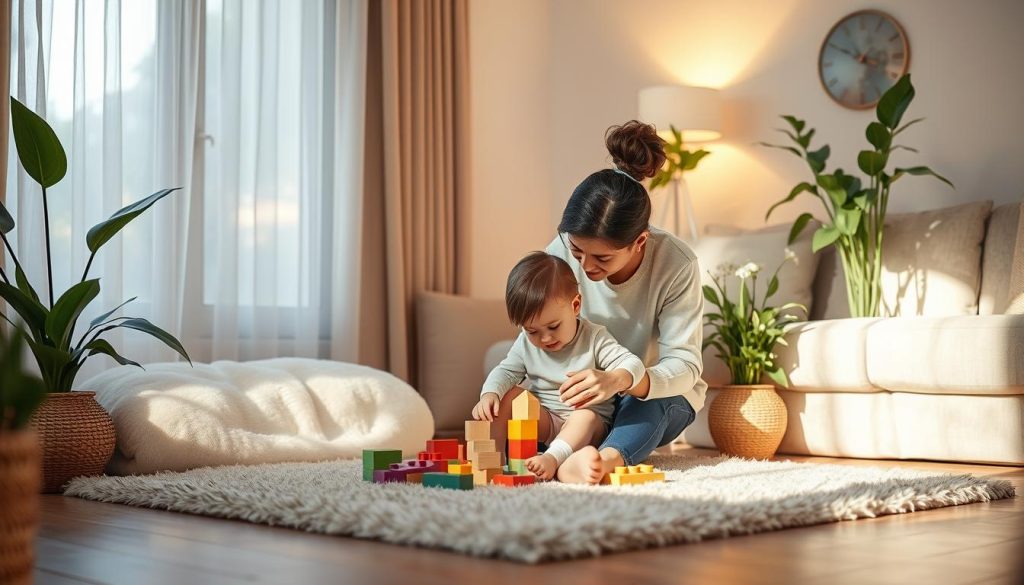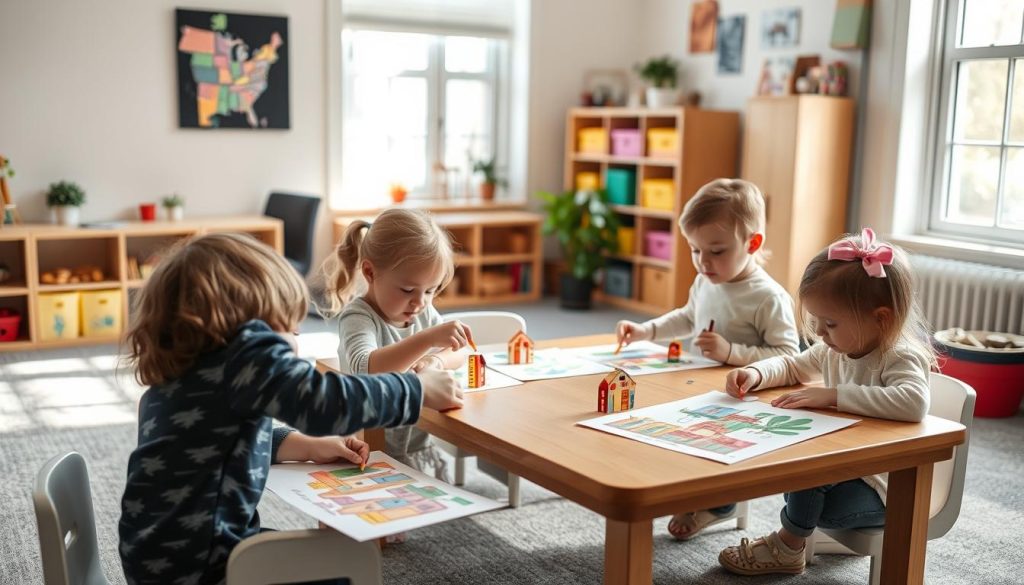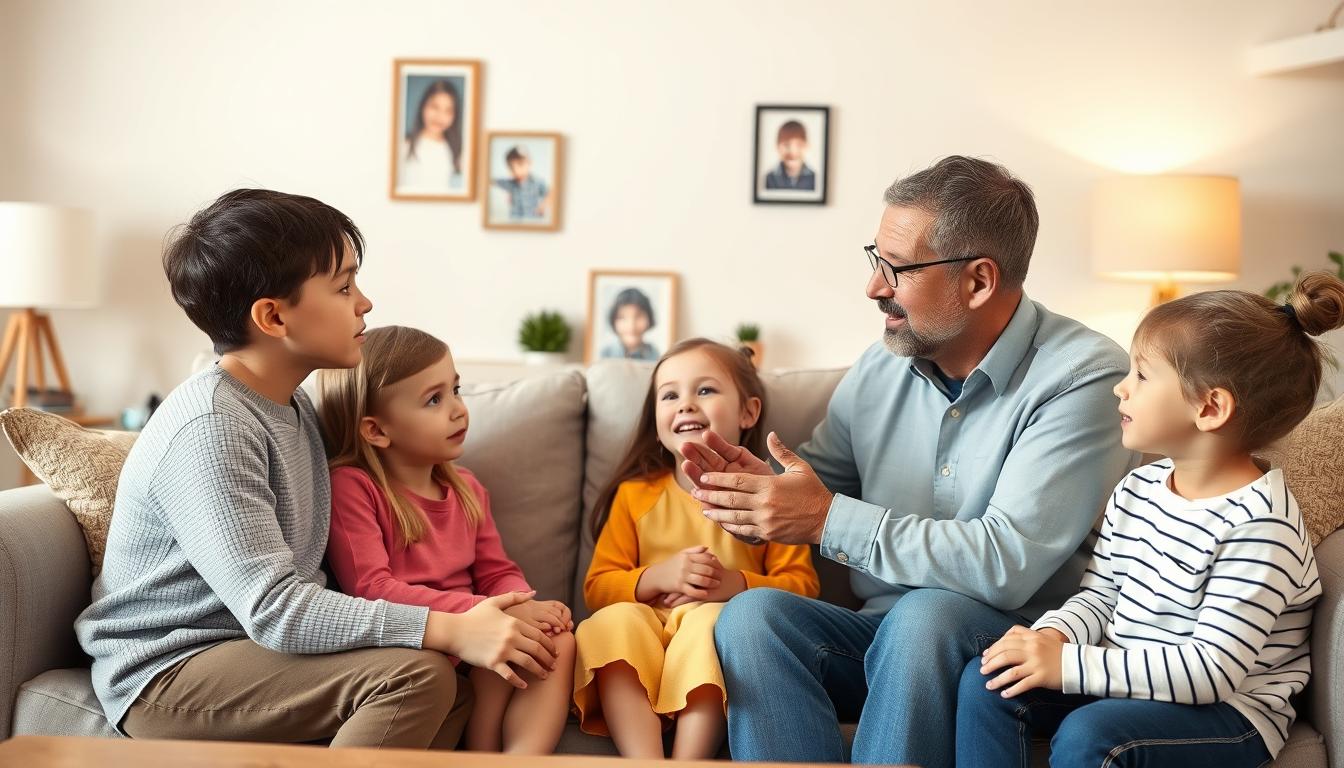Ever thought about how to talk about 9/11 with your kids? It’s a tough topic that can be scary for them. It’s important to talk about it in a way that fits their age and how they feel.
Dr. Lori Walsh, a licensed clinical psychologist, says knowing what your child knows about 9/11 is key. Even if you try to keep them away from it, many kids, especially the older ones, might hear about it. So, it’s important to be ready to answer their questions and make them feel safe.
Key Takeaways
- Adapt the conversation to be age-appropriate: Keep it simple and reassuring for preschoolers, while allowing for open dialogue with older children.
- Parents should be the primary source of information to maintain a sense of security for their kids.
- Choose a calm and private setting to discuss 9/11, ensuring it is a conducive environment for an open conversation.
- Monitor your child’s emotional responses and be ready to provide comfort and support.
- Be prepared for an ongoing dialogue as children process the information and develop more questions.
- Using gentle language and avoiding graphic details can help prevent undue anxiety, particularly in younger children.
- Commemorating the event together through local memorial activities can be an educational and bonding experience.
A1300
Introduction: Preparing Yourself for the Conversation
Talking about 9/11 with your kids needs careful planning. Understand your feelings, get the facts right, and pick the right time and place. This way, the talk will be helpful and supportive.
Understanding Your Own Emotions
Think about how 9/11 affects you before you start the conversation. Diane Partin, a licensed counselor, says knowing yourself is key. This is part of gentle parenting, which values empathy and understanding. Knowing your feelings helps you talk about it calmly and with confidence.
Gathering Accurate Information
It’s important to give kids the right info in a way they can understand. This makes sure your answers are clear and true. It also helps fix any wrong ideas they might have. Knowing the facts well lets you answer their questions well, which is backed by research.

Choosing the Right Time and Place
When and where you talk matters a lot. Pick a safe and comfy spot where your child feels secure. This is good because 75% of kids open up more when they feel supported and heard without judgment.
Choosing a relaxed time for both of you makes the conversation better. This helps your child understand the topic fully.
Following these steps can lead to a good talk about 9/11. By using gentle parenting and being well-prepared, you’re ready to tackle this tough topic. Knowing about family budgeting and online family therapy can also help a lot.
How to Discuss 9/11 with Preschoolers
Talking to preschoolers about September 11 needs to be gentle. Kids aged 4 to 7 can’t handle deep talks about such sad events. So, keep it simple and reassuring. Here’s how to handle this sensitive topic well.
Assessing What They Know
First, find out what your preschooler knows about 9/11. This helps you talk at their level. They might have heard something from older siblings or the news. Start with a broad, light conversation to avoid scaring them.
Keeping It Simple and Reassuring
When you talk about 9/11 to young kids, keep it simple. Talk about the bravery and heroism. Mention the firefighters, police, and others who helped. Resources for K-2 focus on these positive stories to teach without scary details.

Ensuring They Feel Safe
It’s crucial to make preschoolers feel safe. They need to know they’re protected, even when learning about tough topics. Dr. Lori Walsh says it’s key to comfort them about their safety, helping with stepchild issues and divorce too.
Talking about 9/11 with young kids is like guiding them through big life events. It’s like talking to kids about puberty or helping them understand after a divorce. Be comforting and keep it simple, as experts advise for young minds.
Navigating the Conversation with Elementary Schoolers
Elementary schoolers often learn about 9/11 from friends or TV. As parents, it’s key to clear up their understanding. Explain things in a way that makes sense to them.

Start by asking your child what they know about 9/11. *Emphasize* the importance of acknowledging their feelings and offering safety reassurances. This helps them open up, just like when dealing with remarriage or middle child syndrome.
Using visual tools, like feeling charts, can help kids identify their emotions. Older kids might benefit from advanced conflict resolution techniques. Dr. Stephanie Lee recommends using problem-solving baseball and empathetic engagement.
Keep the focus on facts, avoiding complex political issues. Talk about coping skills, similar to managing school behavior problems. This strengthens their emotional processing abilities.
Addressing the Topic with Middle and High Schoolers
Talking to middle and high school students about 9/11 needs a careful touch. They can handle more complex talks.
Encouraging Open Dialogue
Creating a safe space for your child to share their thoughts and feelings is key. Make sure to listen well and avoid judging. This helps kids with anxiety feel heard and understood.
It’s also good to talk about how media and social media affect us today. This way, they see how past events still shape our world.
Sharing Tasteful but Informative Visuals
Using pictures and videos can make hard topics easier to grasp. Choose images that are informative but not too graphic. This helps your child get the big picture without feeling overwhelmed.
Remember, teaching positive behaviors is important. Experts like Dr. Lori Walsh say it helps young people grow strong and resilient.

Being Mindful of Emotional Reactions
It’s vital to understand and support your child’s feelings. Teens might react differently, so be ready to help them. This approach helps with mental health, including eating disorders.
By calmly talking through their fears, you build their trust and security. This is crucial for their emotional well-being.
Conclusion
Talking about 9/11 with your kids is a journey that needs care and flexibility. Start by understanding your feelings and getting the facts right. This helps you have meaningful talks with them.
Children deal with tough topics in their own time. They might need reassurance and a chance to ask questions. It’s important to remember this.
When you talk to kids about 9/11, adjust your words based on their age. Watch for signs of stress or worry in them. If you see any, it might be time to get help from a professional.
These talks can teach kids about bravery, safety, and hope. It’s like teaching them about body positivity or sports. Talking about hard topics with kindness and patience helps them grow.
Events to remember 9/11 can help heal and honor those who lost their lives. These moments bring families and communities together. They show us the power of coming together in tough times.
Just like choosing eco-friendly ways to parent, these events can teach kids valuable lessons. They help kids learn about courage and caring for others, even when things are hard.
FAQ
How should I prepare myself before discussing 9/11 with my kids?
What are the key points to remember when talking to preschoolers about 9/11?
How can I address 9/11 with elementary school children?
What’s important to consider in conversations with middle and high school students about 9/11?
How can I ensure my child feels safe when talking about tragic events?
What should I do if my child shows signs of anxiety after discussing 9/11?
How can I use the conversation about 9/11 to teach important life lessons?
This post contains affiliate links. If you click on a link and make a purchase, I may earn a small commission — at no extra cost to you. Thank you for supporting this blog and helping me keep the patterns free! Read the full Affiliate Disclosure & Transparency.
